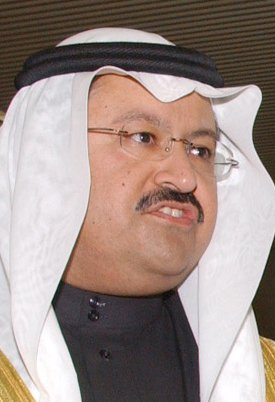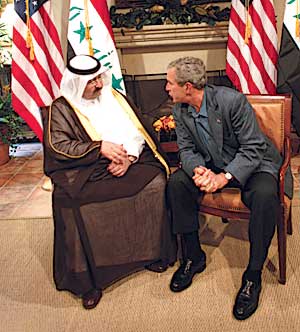Ghazi Mashal Ajil al-Yawer facts for kids
Quick facts for kids
Ghazi Mashal Ajil al-Yawar
|
|
|---|---|
|
غازي مشعل عجيل الياور
|
|

Al-Yawar in 2005
|
|
| Interim President of Iraq | |
| In office 28 June 2004 – 7 April 2005 |
|
| Prime Minister | Ayad Allawi |
| Preceded by | Saddam Hussein (as President of Iraq) Ezzedine Salim (as President of the Governing Council of Iraq) Paul Bremer (as Administrator of the Coalition Provisional Authority) |
| Succeeded by | Jalal Talabani |
| Vice President of Iraq | |
| In office 7 April 2005 – 22 April 2006 Serving with Adil Abdul-Mahdi
|
|
| President | Jalal Talabani |
| Preceded by | Ibrahim al-Jaafari and Rowsch Shaways |
| Succeeded by | Adil Abdul-Mahdi and Tariq al-Hashimi |
| President of the Governing Council of Iraq | |
| In office 17 May 2004 – 1 June 2004 |
|
| President | Paul Bremer |
| Preceded by | Ezzedine Salim |
| Succeeded by | Ayad Allawi (as Prime Minister of Iraq) |
| Personal details | |
| Born | 11 March 1958 Mosul, Iraq |
| Political party | The Iraqis |
| Alma mater | King Fahd University of Petroleum and Minerals American University George Washington University |
Ghazi Mashal Ajil al-Yawar (born in 1958) is an important Iraqi politician. He served as the vice president of Iraq in 2006. Before that, he was the temporary president of Iraq from 2004 to 2005. In 2004, he also led the Iraqi Governing Council, which was set up after the US-led forces entered Iraq.
Al-Yawar was part of the Iraqi Governing Council that formed after the 2003 invasion of Iraq. In 2004, the council chose him to be the temporary President of Iraq. This happened when Iraq regained control of its own government on June 28, 2004.
Early Life and Learning
Ghazi al-Yawar was born in Mosul, Iraq, in 1958. He finished his early schooling in Iraq. He then studied at King Fahd University for Petroleum and Minerals for two years. After that, he earned a degree in civil engineering in the UK. Later, he studied English at American University in Washington, D.C. He received his master's degree from George Washington University in the mid-1980s.
Al-Yawar is a Sunni Muslim. His family, the House of Yawar, has led the Shammar tribe for many centuries. The Shammar is a very large group of tribes in Iraq. It has over 1.5 million people and spreads across Iraq, Syria, and Saudi Arabia. This group includes both Sunnis and Shiites. They are generally moderate in their religious and political views. Al-Yawar once said that his mother took him to visit holy places for both Sunnis and Shiites. This helped him understand and connect with different groups in Iraq.
His uncle, Sheikh Mohsen Ajil al-Yawar, was the head of the Shammar tribe until 2017. His grandfather also helped Iraq become independent in the 1920s. He later served in the king's parliament. When al-Yawar's uncle did not support Saddam Hussein's actions in 1990, the family went to live in London. At that time, al-Yawar was in Saudi Arabia. He chose not to be involved in politics and instead started a successful telecommunications company. He spent many years in Saudi Arabia, where he became a vice president at a company called High Capabilities Co. (HiCap).
Becoming President
After Saddam Hussein's government fell in April 2003, al-Yawar returned to Iraq. His uncle, Mohsen al-Yawar, had asked him to come back. On May 17, 2004, the president of the Iraqi Governing Council, Ezzedine Salim, was killed. After this, Ghazi al-Yawar took over as the temporary president of the Governing Council for May.
During his time as temporary president, al-Yawar spoke out about a common misunderstanding. Many people thought that Arab Sunnis in Iraq had many special benefits under Saddam Hussein. Al-Yawar strongly stated that Saddam treated everyone unfairly, no matter their religion or group. He said Saddam's actions hurt Sunnis, Shiites, Kurds, and all other groups in Iraq.
Al-Yawar was supposed to be the last leader of the Governing Council. His term was to end on June 30, 2004, when Iraq would become fully independent again. However, he was chosen earlier to be Iraq's official Head of State. This role was mostly symbolic. Adnan Pachachi was the preferred choice of the UN envoy, Lakhdar Brahimi. But most members of the Governing Council wanted al-Yawar. They felt the UN was trying to force a president on them. This disagreement delayed the announcement of the new temporary government. But on June 1, 2004, Lakhdar Brahimi confirmed Ghazi al-Yawar as the temporary president. Ayad Allawi, a Shiite Muslim, became the Prime Minister during al-Yawar's presidency. Together, they represented Iraq's two largest Muslim groups. Al-Yawar and the new temporary government officially took power on June 28, 2004. The US-led forces handed over control two days earlier than planned.
Choosing Sheikh Ghazi as interim president showed the growing importance of tribal leaders at that time. Even though his role was mostly ceremonial, it had real meaning and influence. As a Sunni tribal leader, he helped reassure other Sunnis. He also represented a familiar type of leader for the Kurdish tribes. He showed traditional values that Shiite religious leaders respected.
L. Paul Bremer, who was a US administrator in Iraq, wrote in his book that George W. Bush himself wanted al-Yawar to be appointed. Bush was impressed by Ghazi's thanks to the US for removing Saddam. He also liked al-Yawar's strong desire for Iraq to become independent and democratic.
However, many Iraqis felt that the Governing Council, which al-Yawar was part of, had lost trust. This was because it could not solve the problems happening in Iraq in April. Al-Yawar himself had openly criticized the council. He often said it cared more about staying in power than solving the country's serious issues. He felt it only added to Iraq's problems. Al-Yawar said, "We sit in the council while the country is burning and argue over procedure." Like other council members, he faced the challenge of moving past his role in the council.
Al-Yawar made it clear he was not a puppet of the US forces. He strongly criticized the United States for the lack of safety in Iraq. He said, "We blame the United States 100 percent for the security in Iraq." He explained that they took control of the country, got rid of the security groups, and left Iraq's borders open for ten months.
He also criticized the US for staying in Saddam Hussein's former Republican Palace and possibly turning it into their embassy. He said this was like "someone who pokes his finger in another's eye."
During his time as temporary president, the US-led forces surrounded Fallujah. Al-Yawar openly disagreed with this attack. He had almost resigned from the Governing Council earlier because of similar actions. He told Reuters that he completely disagreed with solving the Fallujah issue through military action. He said the way the forces handled the crisis was wrong. He compared it to someone shooting their horse's head because a fly landed on it. He said the horse died, and the fly still got away. He blamed the US-led forces for the situation. He said they were fully responsible for keeping Iraqis safe and providing help, according to the UN resolution.
After Being President
Al-Yawar served as temporary President of Iraq until an elected Iraqi Parliament could choose a new permanent president. This was required by the law for Iraq's transition period. On April 6, 2005, Jalal Talabani was elected president. After much discussion, al-Yawar agreed to serve as one of Iraq's two vice-presidents.
As vice-president, Sheikh Ghazi worked on many challenges facing the new government. Many Iraqi Sunnis did not vote in the elections. Because of this, al-Yawar believed the new constitution should not be based only on those elections. He felt that a large group of Iraqi people could not take part in them. He thought the election results should be used to help balance the constitution for all Iraqis. Al-Yawar said in an interview that the constitution should always be for all Iraqis. It should not be based 100 percent on the wishes of one group, religion, or idea. Instead, it needed to have more common ground for everyone. At this time, al-Yawar also called for keeping religion and politics separate. He believed religion was too important to be mixed with politics.
In the January 2005 Iraqi parliamentary election, al-Yawar led a group of candidates called The Iraqis (Iraqioun). This was the largest non-religious list of candidates with a Sunni leader. His group received about 150,000 votes, which was 2% of the national vote. Al-Yawar was one of the few Sunni leaders who did not boycott the elections. He was also the only Sunni leader of national importance who seemed to get a seat in the assembly. His group won five seats in Parliament.
In the January 2006 election, he joined the Iraqi National List group. This group included other non-religious politicians like Ayad Allawi and Adnan Pachachi. He became a member of the Iraqi Parliament. After a short time, he left Parliament to return to his private life. Some Sunni commentators suggested that al-Yawar's poor election results were because many common Sunni Iraqis did not respect him. They sometimes called him "al Baqara al dhahika," which means "the laughing cow."
About His Family
Al-Yawar has been married since 1984 and has four children.
See also
 In Spanish: Ghazi Mashal Ajil al-Yawer para niños
In Spanish: Ghazi Mashal Ajil al-Yawer para niños
 | Sharif Bey |
 | Hale Woodruff |
 | Richmond Barthé |
 | Purvis Young |


